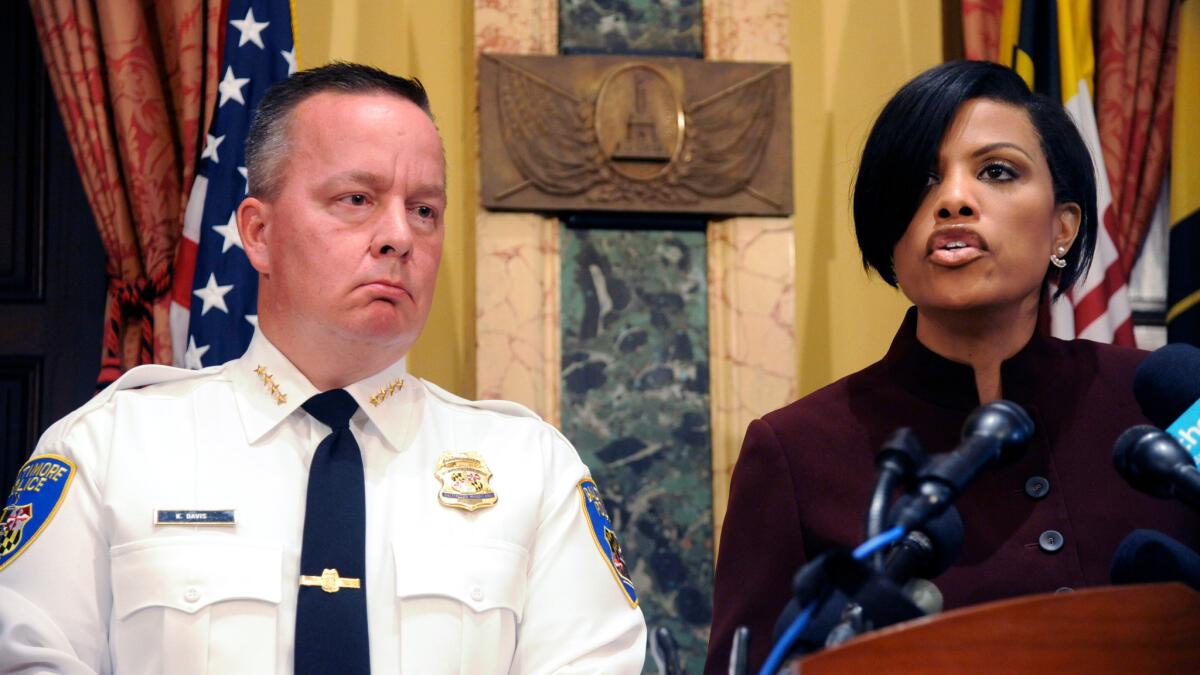Cash-strapped Baltimore expected to spend tens of millions on Justice Department police reform plan

- Share via
Reporting from Baltimore — Baltimore officials estimate the cash-strapped city will have to spend $5 million to $10 million annually to comply with the forthcoming terms of a Justice Department agreement, an expense they say will be paid for by re-prioritizing the budget.
The Justice Department and city have reached an agreement in principle to develop a court-enforceable consent decree that will be designed to address problems uncovered by a lengthy investigation of the police department released this week.
The cost of buying equipment, upgrading technology, training or otherwise improving the department will not be known until the consent decree is drawn up. Mayor Stephanie Rawlings-Blake said she would make “the tough decisions” to find money in the city’s $2.6-billion budget.
City Hall was forced to close a $60-million deficit before approving this year’s budget.
State Sen. Catherine E. Pugh, the Democratic nominee for mayor, also said she would pay for needed improvements to the police department by setting priorities. In heavily Democratic Baltimore, she is favored to win the general election. Rawlings-Blake is not seeking reelection.
“This is going to be a priority for us as a city, but we’ll also be looking to the philanthropic community, the state and our federal partners for assistance,” Pugh said. “Everybody knows that Baltimore is in a tight budget situation. Everybody has to be all in.”
The police department is budgeted to spend $480 million in the current fiscal year, or 18% of the city’s operating budget.
The consent decree is expected to address issues such as use of excessive force and discriminatory searches and arrests.
The city and Justice Department are expected to complete negotiations on the consent decree by Nov. 1, leaving the implementation of the mandates up to the next mayor.
It is unclear how much the state or federal government may contribute.
Maryland Gov. Larry Hogan said Wednesday he had not yet seen the Justice Department report and was not sure how much any required changes might cost.
“We’re going to take a close look at it, and we’re going to see if we can provide any assistance,” Hogan said.
Police Commissioner Kevin Davis said the department would look for any available grants, but typically local jurisdictions have been responsible for reforms required by the Justice Department under similar circumstances.
“Generally, when the Department of Justice comes in under a consent decree, they’re not coming in with a checkbook,” Davis said.
Davis was a high-ranking official on the Prince George’s County police force when the Justice Department required that county to comply to the terms of a consent decree in 2004. It took four and a half years to satisfy the requirements, Davis said.
In an email to the thousands of officers under his command, Davis said that coming to terms with the Justice Department report “presents a challenging moment, but a moment we will be able to reflect upon in the future and know it will set us on a path to better policing.”
The Justice Department outlined routine violations by city police officers of residents’ constitutional rights, as well as specific actions that Davis has called “egregious.” It also found black residents were disproportionately targeted by police.
“Despite these findings, this report is not an indictment on every officer that has the privilege of wearing our uniform, patch and badge,” Davis wrote in his email, which was obtained by the Baltimore Sun.
“You may have an understandable level of anxiety about the fact that you do not engage in the types of behaviors described in this report. It is natural to be offended by some of these details. Why? Because you wear the BPD uniform proudly and serve the citizens of Baltimore honorably.”
Rawlings-Blake said she anticipated that steps the city had taken during the Justice Department investigation would help decrease the time and money it takes to meet the terms of a consent decree.
For example, Baltimore police have added new training standards, retrofitted prisoner transport vans and given officers body cameras.
“The Department of Justice hasn’t seen an administration, mayor, police commissioner as cooperative as Baltimore’s has been with the investigation, and as intentional and aggressive with putting reforms in place,” Rawlings-Blake said.
Wenger and Rector write for the Baltimore Sun. Baltimore Sun staff writer Erin Cox contributed to this report.
More to Read
Sign up for Essential California
The most important California stories and recommendations in your inbox every morning.
You may occasionally receive promotional content from the Los Angeles Times.













